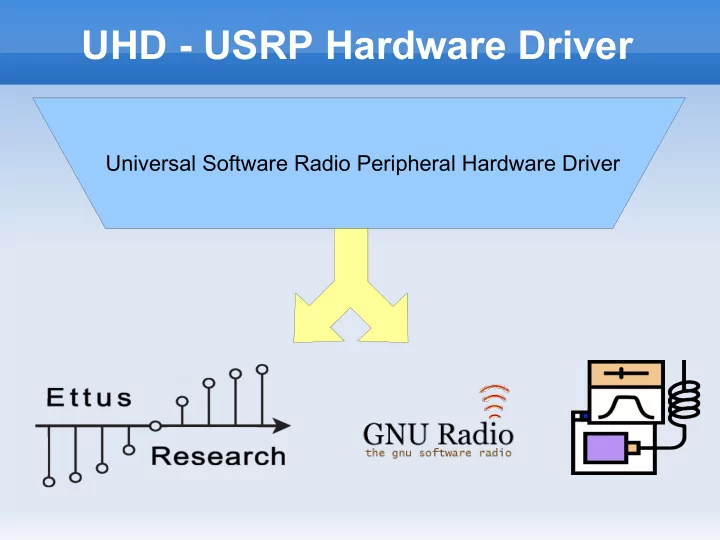

UHD - USRP Hardware Driver Universal Software Radio Peripheral Hardware Driver
A Brief USRP Driver History USRP Libusrp Libusrp-gnuradio Python dboard code C++ dboard code Usrp_* examples and utils USRP2 Libusrp2 (linux only) libusrp2-gnuradio C dboard code in FW Usrp2_* examples and utils USRP N+1? N drivers isnt going to scale...
UHD Intro Single API for all USRP devices C++ based API All daughterboards Multi-channel support & Daughterboards Larger USRP Synchronization Family Channel alignment Gnuradio-UHD Blocks Source Block, Sink Block Python, C++, GRC
Cross Platform Linux, Machintosh, Windows Compilers GCC (all OS) Clang MSVC Cmake Cross platform make Generates native build system Boost Cross platform C++ awesome library ASIO, Math, Unit testing, Program options
Whats in UHD? Find devices on system Instantiate device objects Set/get properties Send/receive samples Send/Recv Samples Device C++ API FPGA Link Layer Implementation Multi-USRP Specifics Set/Get Properties
Device Properties Set/get gain Overall chain or individual elements Set center frequency Overall chain or individual elements Aribitrary readback w/ sensors Is the RF LO locked? Set/get device time Set/get sample rate Antenna selection Frontend selection * See doxygen or <uhd/usrp/multi_usrp.hpp> for more details *
Streaming Interface Streaming samples device->send(...) and device->recv(...) Inherinitly multi-channel Vector of pointers just like gnuradio work() Metadata → aka sample decoration Timestamps, Burst flags Messages Inline messages for receive (recv call) Overflow, stream command error Async messages for transmit (recv async message call) Underflow, sequence error, other... * See doxygen or <uhd/device.hpp> for more details *
Transport Layers USB 2.0 USRP1 B100 UDP/IPv4 USRP2 N2XX Device Node E1XX
The USB 2.0 Transport 480Mbps theoretical, practically 256Mbps 8 Msps @ 32 bits per sample 16 Msps @ 16 bits per sample LibUSB 1.0 Support on all OS Synchronous control transfers Asyncrhonous bulk transfers Windows support via WinUSB http://www.libusb.org/wiki/windows_backend
The UDP/IPv4 Transport 1 Gbps theoretical 25 Msps @ 32 bits per sample Userspace socket implementation Berkely sockets send()/recv() Very portable/works everywhere Boost ASIO handles platform differences
UDP Socket Tweaks Use massive receive socket buffer (50MB) Kernel buffers receive data for you Buffer size severly limited on OSX (1MB) Do something with the send socket buffer Too big on linux, hurts performance Every OS is special Too small on windows, hurts performance Latency optimization Configure ”Interrupt Coalescing” Use smaller packet sizes
UDP Socket Tweaks cont... Bandwidth optimization Use jumbo frames (4096 bytes) Network hardware specific Windows transmit performance registry magic: FastSendDatagramThreshold Crappy network hardware Confused network switches Bad network drivers Packets > MTU size
The USRP Embedded Transport Special kernel module and device node /dev/usrp_e Call ioctl() for FPGA control DMA between FPGA and kernel Memory-mapped ring buffers 1 send buffer ring 1 recv buffer ring 8 Msps @ 32 bits per sample
Sample Framing - VITA49 VITA49 standard for sample framing Layer between samples and USB/UDP/Kernel RX/TX Bidirectional → frames RX and TX packets Stream IDs, Timstamps, sequence count... VRT / VITA49
GNU Radio + UHD Wrapped UHD functionality into gnuradio Source and sink blocks Source work() calls device->recv() Metadata passed via stream tags Sink work calls device->send() Handles multi-channel Sample alignment Time synchronization
GNU Radio + UHD (API) #include <gr_uhd_usrp_source.h> uhd::device_addr_t addr; addr[”name”] = ”Lab USRP11”; C++ API boost::shared_ptr<uhd_usrp_source> usrp = uhd_make_usrp_source( addr, uhd::io_type::COMPLEX_FLOAT32, 1 ); usrp->set_gain(10.0); Code to the API in C++ or Python from gnuradio import uhd Data structures SWIG'd into python addr = uhd.device_addr() addr[”name”] = ”Lab USRP11” Code is basically identical usrp = uhd.usrp_source( device_addr = addr, io_type = uhd.io_type.COMPLEX_FLOAT32, Python API num_channels = 1, ) usrp.set_gain(10.0)
GNU Radio + UHD (GRC)
Future Features Support other over-the-wire types 16 bit samples, 8-bit maybe too A raw mode for custom FPGA stuff Calibration Self calibration (IQ imbalance, DC offset) Select full-scale power level ...or transmit/receive absolute power level Support multi-channel, non-homogenous rates TX stream tags to control timed bursts
Conclusion USRP + UHD + GNU Radio + GRC = Awesome Questions? Comments?
Recommend
More recommend